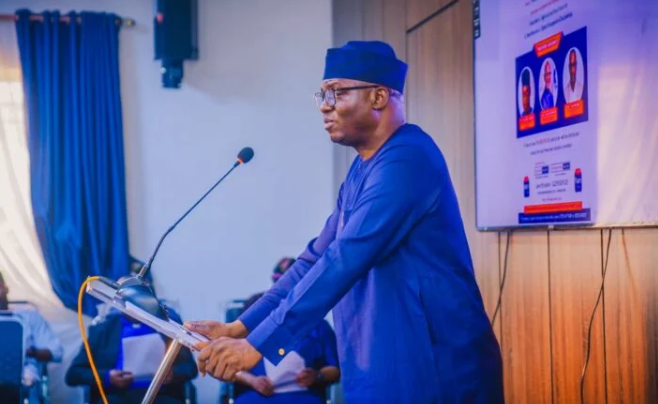Femi Otedola, Billionaire business mogul, has explained why Nigerians, particularly the government should support the Chairman of Dangote Group, Aliko Dangote, by creating an enabling environment to ensure businesses thrive.
Otedola, who rose in defence of his friend and business ally in a post on his X account on Tuesday, described Dangote as a “titan that God created specially for mankind”.
He argued that Dangote’s contributions which extend beyond industrial facilities to critical infrastructure, must be recognised and supported by all means.
He tweeted, “In Nigeria, we have our own titans, and it is imperative that we recognise and support them. Aliko Dangote has broken every boundary in worldwide business and industry. His contributions are not just a testament to his brilliance but a beacon of what is possible when vision meets opportunity.
“Supporting local champions like Dangote is crucial for our national development and economic independence. Let us continue to foster and support these visionaries who drive our nation’s progress.
“My brother, the visionary, has built the largest single train refinery in the world, not in Kano, but in Lagos State. He is the owner of the second-largest sugar refinery in the world, also in Lagos State, and the largest cement factory in the world, not in Kano, but in Kogi State. Additionally, he has established one of the second-largest fertilizer plants in the world, soon to surpass the biggest one in Qatar, also in Lagos State. Furthermore, he has built a fertilizer plant in Lagos that already exports globally. Aliko Dangote is a titan that God created specially for mankind.
“Aliko Dangote is also the largest private sector employer of labor in the country, and his companies are among the largest taxpayers. In fact, the Dangote Group often pays more in taxes than the top banks combined. If not for him, we would still be importing cement.”
According to him, Dangote’s contributions extend beyond industrial facilities to critical infrastructure, having built major roads such as the Apapa Oshodi-Owonrosoki Express Road, Wharf Road, and the Obajana-Kabba Road.
Otedola said, “Countries in the nascent stages of industrialization require visionary leaders. This is why it’s no surprise that the United States was built by the vision and tenacity of a few remarkable individuals—Cornelius Vanderbilt, John D. Rockefeller, Andrew Carnegie, J.P. Morgan, and Henry Ford—The men who built America’s industrial landscape. These men left the world without these assets but left behind a legacy that has kept their country thriving generation after generation. Their contributions were immortalized not in the material wealth they amassed but in the enduring institutions and industries they established. These visionaries were also supported by their government, which recognized the importance of fostering local champions.
“Similarly, today’s tech giants like Microsoft and Tesla received substantial support from the US government. For example, in January 2010, the Department of Energy issued a $465 million loan to Tesla Motors to produce specially designed, all-electric plug-in vehicles and to develop a manufacturing facility in Fremont, California to produce battery packs, electric motors, and other powertrain components for powering these innovative vehicles. This initiative is part of broader efforts, such as the federal EV-charging program supported by the infrastructure law known as the National Electric Vehicle Infrastructure program, or NEVI.
“In India, the government has been instrumental in supporting business titans like Gautam Adani and Mukesh Ambani. Their companies have received significant backing to grow and expand, contributing substantially to India’s economic growth and global business footprint.
“There are also records of emerging market countries like Vietnam, South Africa, Brazil, and China where their governments have supported local businesses to jump-start industrialization. In Vietnam, the government has provided various incentives to tech companies, fostering a rapidly growing technology sector. In South Africa, government support for the mining industry has been crucial in maintaining its global competitiveness. Brazil has seen substantial government investment in its agricultural sector, transforming it into one of the world’s leading food exporters. In China, government backing for companies like Huawei and Alibaba has propelled them to global leadership in technology and e-commerce.”, he explained.
Advertisement





